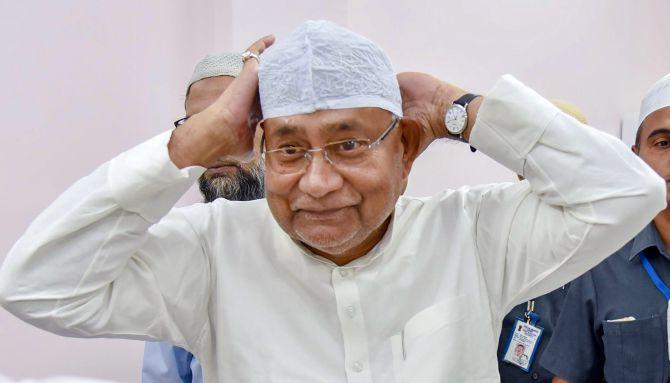TCN News Desk
Patna (Bihar): The recently passed Waqf (Amendment) Bill, 2025, has sparked intense political debate and internal rifts within the state’s ruling Janata Dal (United) or JD(U). The bill, which – the government claims – aims to improve the administration and management of waqf properties in India, has led to the resignation of several JD(U) leaders who voiced their opposition to the legislation.
However, the party has firmly defended its position, reiterating its commitment to “secularism” and to Bihar Chief Minister Nitish Kumar.
In a bid to quell concerns and unity within the party, JD(U) MLC Khalid Anwar emphasised that no Muslim leader would leave the party due to the bill. Speaking to ANI, Anwar stated, “We sent our concerns, and all our concerns were duly answered. JD(U) is a secular, liberal and democratic party, and all its leaders stand firmly with Nitish Kumar. No Muslim leader will leave the party.”
He dismissed the resignations of five JD(U) leaders, including Nadeem Akhtar, Raju Nayyar, Tabrez Siddiqui Alig, Mohammad Shahnawaz Malik and Kasim Ansari, as non-threatening to the party’s core ideology. These leaders had expressed their dismay over the bill, with some accusing the party of betraying the Muslim community.
The All India Muslim Personal Law Board (AIMPLB) had urged all secular political parties, including the Bharatiya Janata Party (BJP) allies, to oppose the bill. In their resignation letters, several JD(U) leaders criticised the party for supporting the bill.
For instance, Mohammad Shahnawaz Malik stated, “Millions of Indian Muslims like us had the firm belief that you are the flag bearer of purely secular ideology. But now this belief has been broken.”
The passage of the Waqf (Amendment) Bill in Parliament has caused a ripple effect in the political landscape, especially as Bihar gears up for the assembly elections. The proposed legislation, which was approved in both the Lok Sabha and the Rajya Sabha, seeks to amend the Waqf Act of 1995 to “enhance” the efficiency of waqf boards, “improve” the registration process and introduce “technological advancements” in managing waqf records.
On the opposite side of the political spectrum, BJP national spokesperson and former Union Minister Syed Shahnawaz Hussain has come out strongly in defence of the Waqf Bill, calling it a “pro-Muslim and pro-poor” legislation.
Hussain told IANS that the bill will empower underprivileged Muslims and help them improve their livelihoods. “The Waqf (Amendment) Bill is in the interest of Muslims. It will benefit the poor among them and give them a chance to develop themselves anew,” he said, addressing concerns that the bill might harm the Muslim community.
Despite the growing backlash from sections of the Muslim community, he dismissed the political impact of JD(U) leaders’ resignations and called them “non-influential faces”. “No such big face is leaving the JD(U). It will not affect the party or the NDA. In fact, this bill will help us gain more votes,” he added with confidence.
He also refuted claims that the bill was biased against Muslims. “The waqf committees will still be headed by Muslims and no religious or community bias is involved. The Opposition is misleading people, just like they did during the Citizenship Amendment Act,” he clarified.
Hussain urged the Muslim community to remain calm and stay informed, asking them not to fall for “propaganda” and reassuring them of Prime Minister Narendra Modi’s commitment to “Sabka Saath, Sabka Vikas” (Together with All, Development for All).
Seemingly attempting to quell the political and social tensions surrounding the bill, Union Minister Chirag Paswan acknowledged the dissatisfaction expressed by some members of the Muslim community but emphasised that such dissatisfaction is a natural part of the democratic process.
“I want to tell every person of the Muslim community that I am grateful for your displeasure, but the reality is that my father also always fought for social justice with dedication,” he said, referring to his late father, Ram Vilas Paswan, who was known for his commitment to social justice.
Paswan reiterated that his political values are rooted in the principles his father stood for and assured the community that his actions would be guided by those values. “I will also work to carry forward his thinking with the same honesty,” he said, adding that only time would reveal whether his decisions would favour the Muslim community.
As the debate over the Waqf (Amendment) Bill intensifies, the political rift within JD(U) and the strong defence of the bill by BJP leaders show how deeply this legislation has divided political opinions. While JD(U) remains resolute in its “secular” stance, claiming that no Muslim leader will abandon the party, the BJP continues to champion the bill as a step toward empowering Muslims, particularly the poor and marginalised.
As the political drama unfolds, all eyes are on the upcoming assembly elections in the state, where the impact of the Waqf Bill and its aftermath will likely play a crucial role in shaping voter sentiments.


